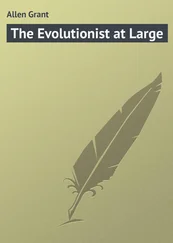Grant Allen - Science in Arcady
Здесь есть возможность читать онлайн «Grant Allen - Science in Arcady» — ознакомительный отрывок электронной книги совершенно бесплатно, а после прочтения отрывка купить полную версию. В некоторых случаях можно слушать аудио, скачать через торрент в формате fb2 и присутствует краткое содержание. Жанр: foreign_edu, История, на английском языке. Описание произведения, (предисловие) а так же отзывы посетителей доступны на портале библиотеки ЛибКат.
- Название:Science in Arcady
- Автор:
- Жанр:
- Год:неизвестен
- ISBN:нет данных
- Рейтинг книги:4 / 5. Голосов: 1
-
Избранное:Добавить в избранное
- Отзывы:
-
Ваша оценка:
- 80
- 1
- 2
- 3
- 4
- 5
Science in Arcady: краткое содержание, описание и аннотация
Предлагаем к чтению аннотацию, описание, краткое содержание или предисловие (зависит от того, что написал сам автор книги «Science in Arcady»). Если вы не нашли необходимую информацию о книге — напишите в комментариях, мы постараемся отыскать её.
Science in Arcady — читать онлайн ознакомительный отрывок
Ниже представлен текст книги, разбитый по страницам. Система сохранения места последней прочитанной страницы, позволяет с удобством читать онлайн бесплатно книгу «Science in Arcady», без необходимости каждый раз заново искать на чём Вы остановились. Поставьте закладку, и сможете в любой момент перейти на страницу, на которой закончили чтение.
Интервал:
Закладка:
In India, for example, there are no cactuses. But I wouldn't advise you to dispute the point with a peppery, fire-eating Anglo-Indian colonel. I did so once, myself, at the risk of my life, at a table d'hôte on the Continent; and the wonder is that I'm still alive to tell the story. I had nothing but facts on my side, while the colonel had fists, and probably pistols. And when I say no cactuses, I mean, of course, no indigenous species; for prickly pears and epiphyllums may naturally be planted by the hand of man anywhere. But what people take for thickets of cactus in the Indian jungle are really thickets of cactus-like spurges. In the dry soil of India, many spurges grow thick and succulent, learn to suppress their leaves, and assume the bizarre forms and quaint jointed appearance of the true cactuses. In flower and fruit, however, they are euphorbias to the end; it is only in the thick and fleshy stem that they resemble their nobler and more beautiful Western rivals. No true cactus grows truly wild anywhere on earth except in America. The family was developed there, and, till man transplanted it, never succeeded in gaining a foothold elsewhere. Essentially tropical in type, it was provided with no means of dispersing its seeds across the enormous expanse of intervening ocean which separated its habitat from the sister continents.
But why are cactuses so almost universally prickly? From the grotesque little melon-cactuses of our English hothouses to the huge and ungainly monsters which form miles of hedgerows on Jamaican hillsides, the members of this desert family are mostly distinguished by their abundant spines and thorns, or by the irritating hairs which break off in your skin if you happen to brush incautiously against them. Cactuses are the hedgehogs of the vegetable world; their motto is Nemo me impune lacessit . Many a time in the West Indies I have pushed my hand for a second into a bit of tangled 'bush,' as the negroes call it, to seize some rare flower or some beautiful insect, and been punished for twenty-four hours afterwards by the stings of the almost invisible and glass-like little cactus-needles. When you rub them they only break in pieces, and every piece inflicts a fresh wound on the flesh where it rankles. Some of the species have large, stout prickles; some have clusters of irritating hairs at measured distances; and some rejoice in both means of defence at once, scattered impartially over their entire surface. In the prickly pear, the bundles of prickles are arranged geometrically with great regularity in a perfect quincunx. But that is a small consolation indeed to the reflective mind when you've stung yourself badly with them.
The reason for this bellicose disposition on the part of the cactuses is a tolerably easy one to guess. Fodder is rare in the desert. The starving herbivores that find themselves from time to time belated on the confines of such thirsty regions would seize with avidity upon any succulent plant which offered them food and drink at once in their last extremity. Fancy the joy with which a lost caravan, dying of hunger and thirst in the byways of Sahara, would hail a great bed of melons, cucumbers, and lettuces! Needless to say, however, under such circumstances melon, cucumber, and lettuce would soon be exterminated: they would be promptly eaten up at discretion without leaving a descendant to represent them in the second generation. In the ceaseless war between herbivore and plant, which is waged every day and all day long the whole world over with far greater persistence than the war between carnivore and prey, only those species of plant can survive in such exposed situations which happen to develop spines, thorns, or prickles as a means of defence against the mouths of hungry and desperate assailants.
Nor is this so difficult a bit of evolution as it looks at first sight. Almost all plants are more or less covered with hairs, and it needs but a slight thickening at the base, a slight woody deposit at the point, to turn them forthwith into the stout prickles of the rose or the bramble. Most leaves are more or less pointed at the end or at the summits of the lobes; and it needs but a slight intensification of this pointed tendency to produce forthwith the sharp defensive foliage of gorse, thistles, and holly. Often one can see all the intermediate stages still surviving under one's very eyes. The thistles, themselves, for example, vary from soft and unarmed species which haunt out-of-the-way spots beyond the reach of browsing herbivores, to such trebly-mailed types as that enemy of the agricultural interest, the creeping thistle, in which the leaves continue themselves as prickly wings down every side of the stem, so that the whole plant is amply clad from head to foot in a defensive coat of fierce and bristling spearheads. There is a common little English meadow weed, the rest-harrow, which in rich and uncropped fields produces no defensive armour of any sort; but on the much-browsed-over suburban commons and in similar exposed spots, where only gorse and blackthorn stand a chance for their lives against the cows and donkeys, it has developed a protected variety in which some of the branches grow abortive, and end abruptly in stout spines like a hawthorn's. Only those rest-harrows have there survived in the sharp struggle for existence which happened most to baffle their relentless pursuers.
Desert plants naturally carry this tendency to its highest point of development. Nowhere else is the struggle for life so fierce; nowhere else is the enemy so goaded by hunger and thirst to desperate measures. It is a place for internecine warfare Hence, all desert plants are quite absurdly prickly. The starving herbivores will attack and devour under such circumstances even thorny weeds, which tear or sting their tender tongues and palates, but which supply them at least with a little food and moisture: so the plants are compelled in turn to take almost extravagant precautions. Sometimes the leaves end in a stout dagger-like point, as with the agave, or so-called American aloe; sometimes they are reduced to mere prickles or bundles of needle-like spikes; sometimes they are suppressed altogether, and the work of defence is undertaken in their stead by irritating hairs intermixed with caltrops of spines pointing outward from a common centre in every direction. When one remembers how delicately sensitive are the tender noses of most browsing herbivores, one can realize what an excellent mode of defence these irritating hairs must naturally constitute. I have seen cows in Jamaica almost maddened by their stings, and even savage bulls will think twice in their rage before they attempt to make their way through the serried spears of a dense cactus hedge. To put it briefly, plants have survived under very arid or sandy conditions precisely in proportion as they displayed this tendency towards the production of thorns, spines, bristles, and prickles.
It is a marked characteristic of the cactus tribe to be very tenacious of life, and when hacked to pieces, to spring afresh in full vigour from every scrap or fragment. True vegetable hydras, when you cut down one, ten spring in its place: every separate morsel of the thick and succulent stem has the power of growing anew into a separate cactus. Surprising as this peculiarity seems at first sight, it is only a special desert modification of a faculty possessed in a less degree by almost all plants and by many animals. If you cut off the end of a rose branch and stick it in the ground under suitable conditions, it grows into a rose tree. If you take cuttings of scarlet geraniums or common verbenas, and pot them in moist soil, they bud out apace into new plants like their parents. Certain special types can even be propagated from fragments of the leaf; for example, there is a particularly vivacious begonia off which you may snap a corner of one blade, and hang it up by a string from a peg or the ceiling, when, hi, presto! little begonia plants begin to bud out incontinently on every side from its edges. A certain German professor went even further than that; he chopped up a liverwort very fine into vegetable mincemeat, which he then spread thin over a saucerful of moist sand, and lo! in a few days the whole surface of the mess was covered with a perfect forest of sprouting little liverworts. Roughly speaking, one may say that every fragment of every organism has in it the power to rebuild in its entirety another organism like the one of which it once formed a component element.
Читать дальшеИнтервал:
Закладка:
Похожие книги на «Science in Arcady»
Представляем Вашему вниманию похожие книги на «Science in Arcady» списком для выбора. Мы отобрали схожую по названию и смыслу литературу в надежде предоставить читателям больше вариантов отыскать новые, интересные, ещё непрочитанные произведения.
Обсуждение, отзывы о книге «Science in Arcady» и просто собственные мнения читателей. Оставьте ваши комментарии, напишите, что Вы думаете о произведении, его смысле или главных героях. Укажите что конкретно понравилось, а что нет, и почему Вы так считаете.












